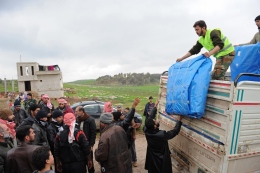There are some Ohio State students who feel the United States needs to take a more active role of aid in the Syrian civil war.
The Syrian people began protesting the Syrian government, including Syrian President Bashar al-Assad, in 2011 because they wanted a democracy. The government responded with violence, leading to a civil war that continues to this day.
More than 1.5 million Syrians have left the country. There are more than 100,000 documented people who have been killed and thousands remain missing, according to multiple sources.
The Syrian government, meanwhile, considers the Free Syrian Army a terrorist operation. Syria’s permanent representative to the United Nations, Bashar al-Jaafari, said at a UN Security Council session June 17 that the Free Syrian Army has been committing crimes against Syrian children in Syria and that the Syrian government aims to protect those children, according to the Syrian Arab News Agency.
Some OSU students being affected by the conflict have looked to the international community and the American government for help.
Abdulrahman Alwattar is the president of the OSU Muslim Student Association and a third-year in public affairs. He is originally from Damascus, Syria and still has family living there.
Two of Alwattar’s cousins have died, one of them fighting for the Free Syrian Army, the group fighting against the Syrian government. The other death occurred last month because of a bombing.
“I find it interesting that the whole world is more concerned with how people are being killed but not that they are being killed,” Alwattar said.
He said he thinks it’s strange that the international community requires the Syrian government to be using chemical weapons before it intervenes. The White House confirmed June 13, though, the Syrian government is using chemical weapons against the Free Syrian Army, crossing U.S. President Barack Obama’s “red line.”
Yisser Bittar, the Syrian American Council’s government relations and advocacy assistant, also said she thinks the war deserves more attention than it has been receiving.
“This is the worst humanitarian crises in modern history,” Bittar said in an interview with The Lantern. “As an American, I think it is important to understand that the Syrian government is willing to wipe the entire region on fire.”
Other OSU students are hopeful U.S. help will be effective.
Eyad Hamza, a third-year in economics, has also lost a cousin to the Syrian civil war. His grandmother came to America a few months ago because of the harsh conditions – there are only a few hours of electricity per day, water pressure is weak and there is limited freedom to be had overall.
“All I can hope is that this U.S. intervention changes the tides a little bit so that we can see some change,” Hamza said.
Bittar thinks Obama’s “red line” should have lower standards.
“Saying the red line would be the use of chemical weapons is meaning that the president is giving the green light to use whatever else,” Bittar said.
The White House said it would send the rebels small weaponry and ammunition when the discovery was made, something Bittar said will help.
“This is good for the Free Syrian Army as the international community has left the army completely on its own,” Bittar said.
Qatar and Saudi Arabia have been sending supplies to the Free Syrian Army as well, but Bittar said those supplies are the equivalent of one week’s worth of the supplies Russia has been sending to the Syrian government, Bittar said.
The rest of the Free Syrian Army’s weapons are handmade or from government military bases they take over, making the fight unfair in Bittar’s eyes.
“There is obviously an unequal playing field,” Bittar said. “(The members of the Free Syrian Army) have been left alone.”
Bittar said the weapons the U.S. will supply to the army should help over a short term but will most likely not change the war in the Free Syrian Army’s favor.
“It could help sustain Syrian grounds the army has already taken over, but at the end of the day, more needs to be done by the administration so the rebels can be empowered to win and the conflict can end,” she said.



